Origin of Islam
Islam emerged in Arabia with Prophet Muhammad’s birth in 570 CE. His prophethood began in 610 CE with divine revelations, forming the Quran. The early Islamic community in Mecca laid the foundation for a global faith, emphasizing monotheism and moral guidance. This period marked the beginning of a transformative religious and cultural movement.
1.1. The Birth of Prophet Muhammad (570 CE)
Prophet Muhammad, the founder of Islam, was born in Mecca, Arabia, around 570 CE. He was born into the Quraysh tribe, a prominent clan in Mecca, and his lineage traced back to Abraham. Orphaned at a young age, Muhammad was raised by his uncle Abu Talib. His birth marked a pivotal moment in history, as he would later become the final prophet in Islam, guiding humanity with divine revelations. This event is deeply revered in Islamic tradition, symbolizing the beginning of a transformative era.
1.2. The Revelation and Prophethood (610 CE)
In 610 CE, Prophet Muhammad received his first divine revelation through the Angel Gabriel in the Cave of Hira near Mecca. This marked the beginning of his prophethood and the revelation of the Quran. The first verses of Surah Al-Alaq emphasized the importance of reading and understanding divine guidance. Over 23 years, Muhammad received continuous revelations, forming the Quran and guiding followers on worship, moral conduct, and social justice. This period laid the spiritual and ethical foundation of Islam, transforming Muhammad into a religious and moral leader.
1.3. Early Islamic Community in Mecca
The early Islamic community in Mecca emerged after Prophet Muhammad began preaching the divine revelations he received. The Quranic teachings emphasized monotheism, moral integrity, and social justice, attracting a small but dedicated group of followers. Despite facing persecution from the Meccan elite, the community grew, united by their faith and rituals such as prayer. This period laid the foundation for Islamic practices and the bonds of brotherhood among believers, shaping the spiritual and social identity of the burgeoning faith. The First Pledge of Aqaba marked a turning point, solidifying their commitment to the cause.
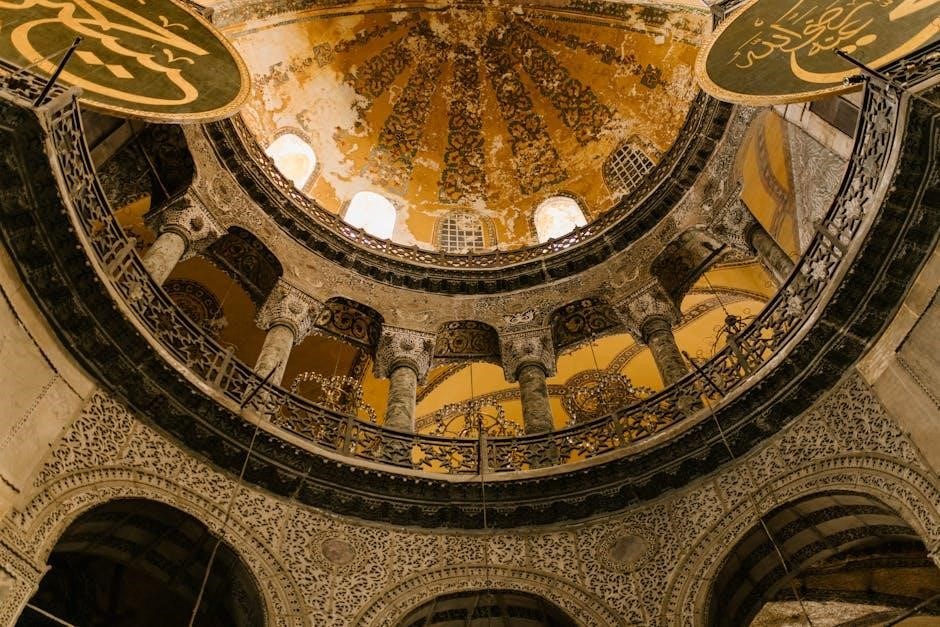
The Life of Prophet Muhammad
Prophet Muhammad, born in 570 CE, became Islam’s final prophet. His teachings, revealed from 610 CE, transformed Arabia, emphasizing monotheism, justice, and compassion. His leadership and example shaped the Islamic community, guiding followers through challenges and victories, leaving a lasting legacy as a religious, moral, and political leader.
2.1. The Hijra (622 CE): Migration to Medina
The Hijra, or migration, occurred in 622 CE when Prophet Muhammad moved from Mecca to Medina to escape persecution. This pivotal event marked the beginning of the Islamic calendar. It followed increasing hostility toward Muslims in Mecca, leading to a divine command for the Prophet to relocate. The journey, though perilous, ensured the survival and growth of the Muslim community. In Medina, Muhammad established the first Islamic state, uniting tribes under a shared faith and laying the foundation for Islam’s expansion. This migration is celebrated as a testament to resilience and divine guidance.
2.2. The Establishment of the First Islamic State

In Medina, Prophet Muhammad established the first Islamic state, uniting diverse tribes under a shared religious and political framework. The Constitution of Medina, a seminal document, outlined laws and rights, ensuring justice and equality for all citizens, including non-Muslims. This period saw the implementation of Islamic governance, fostering a cohesive community. The state’s foundation was rooted in fairness, mutual respect, and adherence to divine principles, setting a precedent for future Islamic societies and solidifying Muhammad’s role as both a religious and political leader.
2.3. Key Events in Medina (623-632 CE)
During this period, Prophet Muhammad strengthened the Muslim community through key events; The Battle of Badr (624 CE) marked a decisive victory, while the Battle of Uhud (625 CE) tested resilience. The Battle of the Trench (627 CE) showcased strategic brilliance. The Treaty of Hudaybiyah (628 CE) led to the peaceful conquest of Mecca (630 CE). These events solidified Islam’s presence, established justice, and fostered unity. They also highlighted Muhammad’s leadership in both spiritual and political realms, laying the groundwork for Islam’s expansion and enduring legacy.
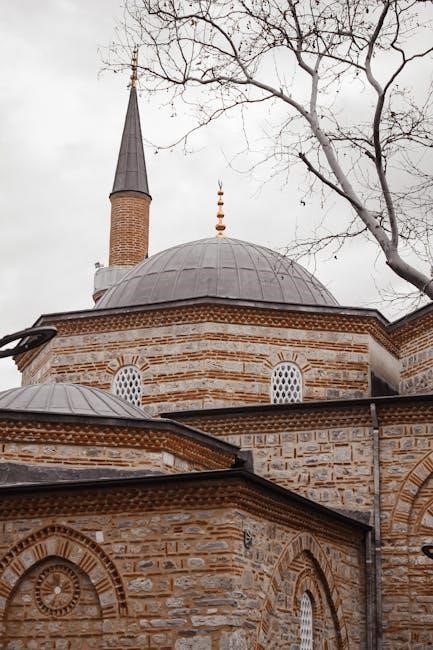
The Expansion of Islam
Islam’s expansion began with the Rashidun Caliphate, spreading from Arabia. The Umayyad and Abbasid Caliphates extended the empire, fostering a rich cultural and scientific legacy globally.
3.1. The Rashidun Caliphate (632-661 CE)
The Rashidun Caliphate, following Prophet Muhammad’s death, was led by four rightly guided caliphs. Abu Bakr united Arabia, Umar expanded into Persia and Byzantium, Uthman oversaw the Quran’s compilation, and Ali faced internal conflicts. This period saw rapid territorial expansion, establishing Islam as a dominant force, and laid the foundation for future Islamic governance and societal structures across the Middle East and beyond.
3.2. The Umayyad Caliphate (661-750 CE)
The Umayyad Caliphate began with Muawiya ibn Abu Sufyan, marking a shift from religious to dynastic rule. The capital moved to Damascus, fostering centralized governance and territorial expansion into Spain, North Africa, and Central Asia. This period saw cultural advancements, including Islamic art and architecture, but also faced internal conflicts and regional tensions. The Umayyads’ rule ended with the Abbasid Revolution in 750 CE, leading to their downfall and the rise of a new dynasty.
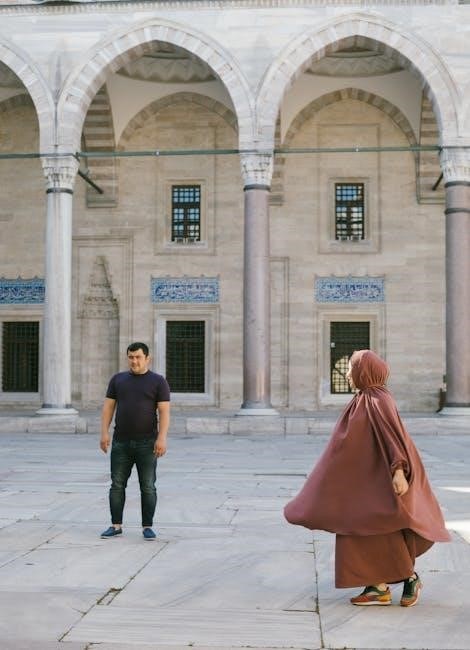
3.3. The Abbasid Caliphate (750-1258 CE)
The Abbasid Caliphate, established after the fall of the Umayyads, shifted its capital to Baghdad, becoming a center of culture and learning. This period, known as the Islamic Golden Age, saw advancements in science, mathematics, medicine, and astronomy. Scholars translated Greek and Roman texts, preserving ancient knowledge. However, internal conflicts, regional fragmentation, and external pressures led to its decline. The caliphate ended with the Mongol invasion in 1258 CE, marking the collapse of a once-vibrant empire that had profoundly shaped Islamic civilization and global intellectual heritage.
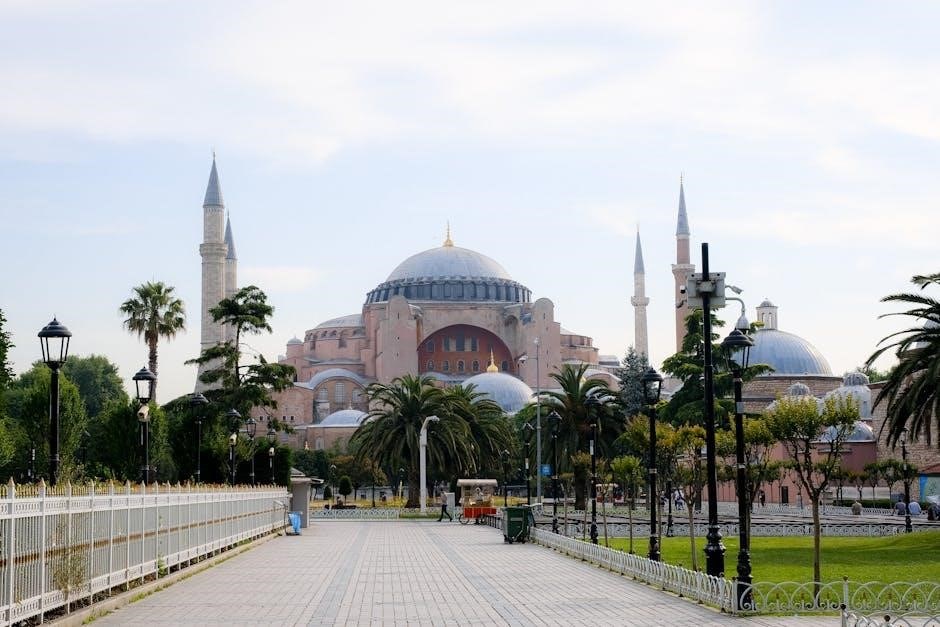
Key Events in Islamic History
Key events include the Hijra (622 CE), the Rashidun Caliphate, the Umayyad expansion, the Battle of Karbala (680 CE), and the fall of Baghdad (1258 CE).
4.1. The Battle of Karbala (680 CE)
The Battle of Karbala occurred on October 10, 680 CE, in modern-day Iraq. It involved Imam Husain, grandson of Prophet Muhammad, and the Umayyad forces under Yazid I. Husain’s refusal to pledge allegiance to Yazid led to a brutal confrontation. Despite being vastly outnumbered, Husain and his followers fought courageously but were slain. This event became a symbol of resistance against oppression and is deeply mourned by Shia Muslims during Ashura. It remains a pivotal moment in Islamic history, shaping Shia-Sunni dynamics and Islamic identity.
4.2. The Fall of Baghdad (1258 CE)
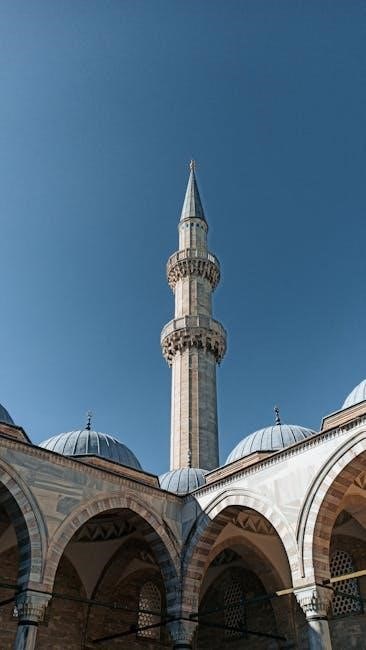
The Fall of Baghdad occurred in 1258 CE when Mongol forces under Hulagu Khan sacked the city, marking the end of the Abbasid Caliphate. The city suffered widespread destruction, and the caliph, Al-Musta’sim, was executed. This event severely weakened Islamic political unity and cultural centers, leading to a decline in Abbasid influence. The Mongols’ conquest reshaped the Middle East, causing lasting impacts on Islamic governance and intellectual life, while signaling the rise of new regional powers.
4.3. The Rise of Islamic Civilization
The Islamic Golden Age (8th–13th centuries) saw unparalleled advancements in science, mathematics, medicine, and astronomy. Centers like Baghdad, Cairo, and Córdoba became hubs of learning, attracting scholars worldwide. Muslim polymaths such as Al-Khwarizmi and Ibn Sina made groundbreaking contributions, influencing global knowledge. The preservation and translation of ancient texts, including Greek and Persian works, laid the foundation for later scientific revolutions. This period also flourished in arts, architecture, and literature, leaving a lasting legacy in Islamic and world heritage.
Cultural and Scientific Contributions
Islam’s Golden Age spurred advancements in science, mathematics, and medicine, with scholars like Al-Khwarizmi and Ibn Sina pioneering breakthroughs that shaped global knowledge and innovation.
5.1. The Islamic Golden Age
The Islamic Golden Age, spanning the 8th to 14th centuries, was a period of remarkable cultural and scientific advancement. Scholars in the Islamic world made significant contributions to mathematics, astronomy, medicine, and philosophy. Figures like Al-Khwarizmi and Ibn Sina revolutionized their fields, laying the groundwork for future discoveries. This era also saw the preservation and translation of ancient texts, ensuring the survival of knowledge that would later influence European enlightenment. Islamic civilization flourished, creating a legacy of intellectual and cultural richness.
5.2. Contributions to Science, Mathematics, and Medicine
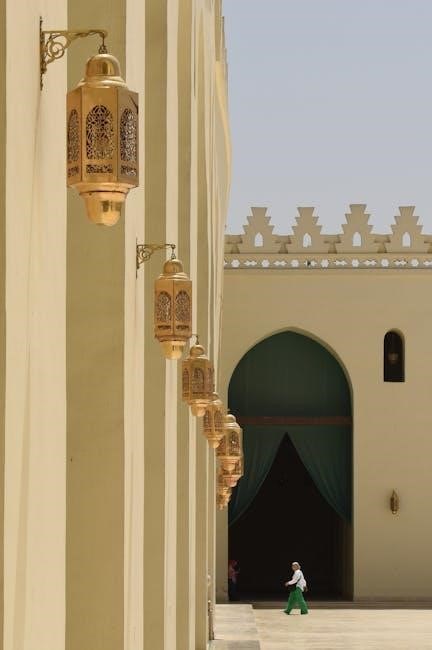
During the Islamic Golden Age, scholars made groundbreaking contributions to science, mathematics, and medicine. Al-Khwarizmi pioneered algebra, while Al-Battani advanced trigonometry and astronomy. Ibn Sina’s “The Canon of Medicine” became a foundational text in healthcare for centuries. Muslim scientists also excelled in chemistry, optics, and engineering, laying the groundwork for later scientific revolutions. Their work preserved and expanded upon ancient Greek and Roman knowledge, ensuring its transmission to Europe and beyond, thus shaping the course of global scientific development.
5.3. The Preservation and Translation of Knowledge
During the Islamic Golden Age, scholars meticulously preserved and translated ancient texts from Greek, Persian, and Roman civilizations into Arabic. This effort, often conducted in institutions like the House of Wisdom in Baghdad, safeguarded valuable knowledge that might have otherwise been lost. Translators such as Hunayn ibn Ishaq played pivotal roles in rendering philosophical, scientific, and medical works. These translations not only preserved ancient wisdom but also facilitated its transmission to Europe, enriching global intellectual heritage and fostering cross-cultural understanding for centuries to come.
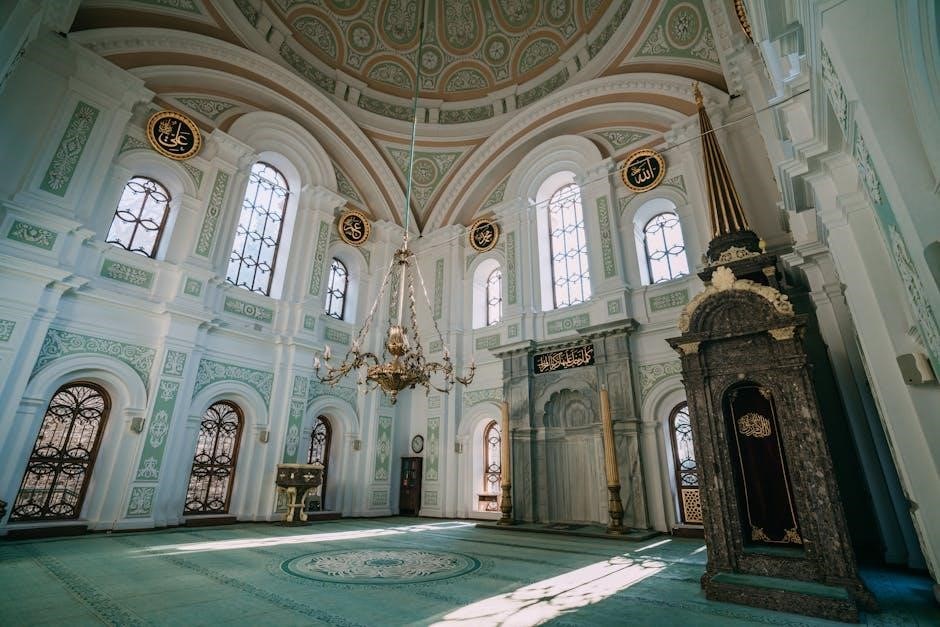
Modern Developments in Islamic History
Modern Islamic history includes post-colonial independence movements, the rise of nation-states, and contemporary challenges such as globalization and religious extremism, shaping Islam’s role in the 21st century.
6.1. The Impact of Colonialism
Colonialism profoundly shaped Islamic history, as European powers dominated Muslim-majority regions from the 18th to 20th centuries. This era disrupted traditional political structures, reshaped economies, and imposed foreign systems of governance. The decline of the Ottoman Empire and the fragmentation of Muslim lands under colonial rule led to a loss of cultural autonomy. Resistance movements emerged, blending Islamic identity with nationalist aspirations. Colonization also influenced modern Islamic thought, as scholars sought to reconcile tradition with the challenges of a rapidly changing world.
6.2. The Independence of Muslim States
Muslim states gained independence in the mid-20th century, largely due to post-WWII decolonization. Countries like Pakistan (1947) and Indonesia (1945) emerged, affirming Islamic identity. The dissolution of the Soviet Union in 1991 led to Central Asian Muslim-majority states like Uzbekistan and Kazakhstan gaining independence. These nations sought to redefine their governance, balancing Islamic traditions with modern statehood. The process often involved overcoming colonial legacies and internal conflicts, shaping diverse political and cultural frameworks rooted in Islamic heritage and the quest for self-determination;
6.3. Contemporary Issues in the Islamic World
The Islamic world faces diverse challenges, including extremism, political instability, and socioeconomic disparities. Many Muslim-majority countries grapple with governance issues, human rights concerns, and cultural identity. The legacy of colonialism and its impact on modern nation-states remain contentious. Additionally, the integration of Islamic values with globalization and secularism is a recurring debate. These issues shape the complex landscape of the Islamic world, influencing both internal development and its global interactions, as nations strive to balance tradition with modernity and address the needs of diverse populations.